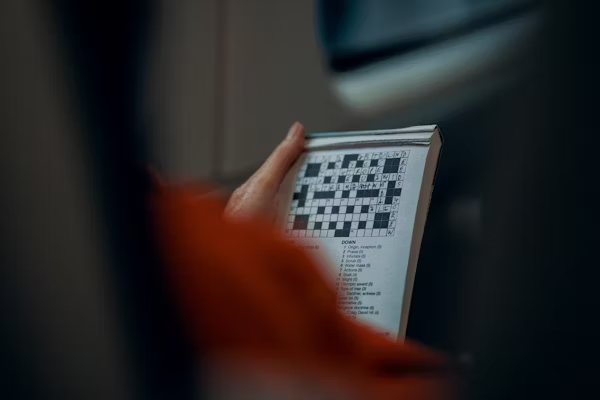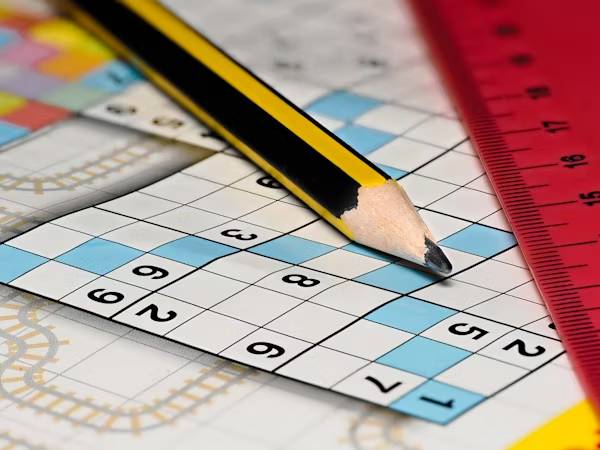Ever found yourself settling down with your morning coffee and the daily newspaper, flipping straight to that intriguing grid of black and white squares? Or maybe you unwind in the evening by tackling a digital crossword challenge on your tablet? For millions, crossword puzzles aren’t just a pastime; they’re a beloved ritual, a fun way to test their knowledge and pass the time. But what if this enjoyable habit was doing so much more than just providing entertainment? What if it was actively exercising, strengthening, and protecting your most vital organ – your brain?
Emerging scientific evidence strongly suggests that engaging with crossword puzzles offers significant cognitive benefits. It’s not just about knowing obscure words or random trivia; it’s about the intricate mental workout involved in solving them. This article delves deep into the science behind this classic brain game, exploring precisely why crosswords are good for your brain and how they support mental acuity. We’ll uncover how they can enhance memory, sharpen cognitive functions, potentially act as a buffer against dementia, and even lift your mood. If you’ve ever wondered if your puzzle habit is truly beneficial, or if you’re looking for an accessible and enjoyable way to support your brain health, read on. The answers might just surprise and motivate you.
Crosswords as Brain Armor: Fighting Cognitive Decline & Dementia
Let’s start with one of the most compelling reasons why crosswords are good for your brain: their potential neuroprotective effects, particularly concerning dementia and age-related cognitive decline. Think of your brain like a muscle, or perhaps like a complex city’s road network – the more you challenge it in varied ways, the stronger and more resilient it becomes. Crosswords provide a specific type of mental stimulation that seems particularly effective.
Delaying Dementia’s Onset: The Power of Puzzling
Dementia, including its most common form, Alzheimer’s disease, casts a long shadow, affecting millions worldwide. While there’s no single magic bullet for prevention, research increasingly points towards lifestyle factors playing a crucial role. Engaging in mentally stimulating activities is high on that list, and crosswords appear to be a standout performer in this cognitive workout.
A significant longitudinal study, published in a leading medical journal and cited in our source material, followed nearly 500 cognitively healthy older adults. The findings were striking: individuals who regularly engaged in crossword puzzles experienced a delay in the onset of accelerated memory decline by an average of 2.54 years compared to those who didn’t solve puzzles regularly. That’s a significant extension of high-level cognitive function!
What’s particularly fascinating is that this benefit held true even when researchers accounted for the participants’ level of education [^3]. This suggests that it’s not just about having a higher baseline intellect; the act of regularly solving crosswords itself confers a protective advantage. This points powerfully to the concept of cognitive reserve.
Understanding Cognitive Reserve: Your Brain’s Backup System
So, what is cognitive reserve? Imagine it as your brain’s built-in backup system, resilience fund, or ‘mental buffer’. It’s the mind’s ability to withstand neurological damage (like that caused by aging or dementia pathology) without showing obvious signs of decline. Engaging in complex mental activities, like the problem-solving inherent in crosswords, helps build this reserve. By constantly challenging your brain to retrieve information, make connections, and think flexibly, you’re essentially strengthening neural pathways and potentially creating alternative routes – like mental ‘detour routes’ – for cognitive processes. So, even if some parts of the brain are affected by age or disease, a higher cognitive reserve allows other networks to compensate, maintaining function for longer. This protective effect is a key part of why crosswords are good for your brain‘s long-term health and resilience.
Crosswords vs. Digital Brain Games: A Surprising Showdown
In our tech-savvy world, many assume that sophisticated computer-based brain training games must be superior for cognitive enhancement. However, research offers a more nuanced, even surprising, perspective. A randomized controlled trial involving older adults with Mild Cognitive Impairment (MCI) – often considered a precursor stage to dementia – compared the effects of intensive crossword puzzle training versus computerized cognitive games over 78 weeks .
The results, published in NEJM Evidence, challenged common assumptions. Participants who engaged in the traditional crossword puzzle training showed greater improvement in cognitive scores, particularly in areas related to verbal memory and learning, compared to those using the digital games. Even more compelling, brain imaging (MRI) revealed less brain shrinkage (a common marker of dementia progression) in the crossword group, especially in the hippocampus – a region absolutely critical for memory formation .
Now, this doesn’t mean digital games lack value, but it strongly underscores the unique and potent benefits derived from traditional crossword solving. The specific demands of crosswords – retrieving vocabulary, understanding nuanced clues, integrating information across intersecting words – seem to provide a particularly effective workout for brain regions vulnerable in aging and MCI. This finding powerfully illustrates why crosswords are good for your brain, offering a distinct advantage even over some modern technological interventions. For further reading on brain health, resources like the National Institute on Aging offer valuable public information.
Sharpen Your Recall: How Crosswords Supercharge Your Memory

Beyond long-term defense, what about day-to-day recall? Crosswords offer immediate and tangible benefits for memory function. Whether it’s remembering where you put your keys, recalling a name, or learning new information, memory is central to our daily lives. Here’s how puzzling helps provide a significant memory boost.
A Workout for Different Memory Systems
Crosswords act as a potent workout for various crucial memory systems:
- Working Memory: Think of this as your mental scratchpad. When you solve a clue, you often need to hold potential answers (“Is it ‘EARTH’ or ‘HEART’? Does the ‘A’ fit the down clue?”) in your mind while considering intersecting possibilities. This mental juggling act heavily engages and strengthens your working memory.
- Episodic Memory: This is your memory for personal experiences and specific events. Crosswords frequently require you to dip into these long-term stores to retrieve facts, historical details, pop culture references, or geographical knowledge learned in the past. This process of active recall strengthens the neural pathways, making that information easier to access later. Functional MRI (fMRI) studies confirm activities like crosswords activate networks involved in retrieving these kinds of memories.
- Semantic Memory: This is your general knowledge base – facts, concepts, and especially vocabulary. Crosswords are fundamentally an exercise in semantic memory. Deciphering clues like “Liquid rock from a volcano” (LAVA) or “A group of lions” (PRIDE) directly taps into and reinforces this vital knowledge library.
Research indicates that regular crossword solvers tend to exhibit increased volume in the hippocampus and certain cortical areas , regions indispensable for forming, storing, and retrieving memories. The study mentioned earlier also found that pre-dementia, individuals who regularly did crosswords maintained higher memory scores for longer periods compared to non-puzzlers. This constant mental retrieval practice is fundamental to why crosswords are good for your brain’s memory power and memory retention.
The Dopamine Connection: The Sweet Reward of the “Aha!” Moment
Ever felt that rush of satisfaction, that little mental fist-pump, when you finally crack a tough clue? That feeling isn’t just psychological; it’s neurochemical. Successfully solving a part of the puzzle triggers a release of dopamine in your brain’s reward pathways .
Dopamine is often called the “feel-good” neurotransmitter, but its role goes far beyond pleasure. It’s crucial for motivation, learning, and memory consolidation. When solving a clue leads to a dopamine surge, it creates a powerful positive reinforcement loop. Your brain essentially says, “Hey, that felt good! Let’s do that again.” This not only motivates you to keep puzzling but also enhances the encoding of the information you just successfully retrieved or learned. It makes the learning process stickier and more enjoyable. This neurochemical reward system contributes significantly to why crosswords are good for your brain and might even explain why some studies suggest regular puzzlers have brains that function as if they are years younger [^4]. Getting that daily dopamine hit is easy with quick puzzles found at places like Mini Crossword Answers Today.
More Than Words: The Full Cognitive Workout from Crosswords
But the benefits don’t stop at memory and dementia prevention. Crosswords engage a wide array of cognitive functions, providing a truly holistic mental workout. Understanding this multifaceted engagement helps clarify why crosswords are good for your brain in a much broader sense.
Sharpening Executive Functions: Your Brain’s CEO
Executive functions are the high-level cognitive processes managed primarily by your prefrontal cortex. Think of them as your brain’s CEO, responsible for planning, decision-making, problem-solving, self-control, and managing complex tasks. Crosswords provide excellent training for these critical skills:
- Planning & Strategy: Deciding where to start – easy clues first? Fill a corner? Tackle the long answers? – involves strategic thinking.
- Problem-Solving: Every clue is a mini-problem demanding analysis, hypothesis testing (trying potential answers), and verification against the grid.
- Working Memory: As we’ve seen, holding clues and potential answers in mind is central.
- Cognitive Flexibility (Mental Flexibility): You need to constantly shift mental gears. A clue might be a synonym, a pun, an anagram, or trivia. You must flexibly switch between thinking styles and knowledge domains.
- Inhibition Control: Sometimes the most obvious answer isn’t right. You need to inhibit that first impulse and consider alternatives that fit the grid’s constraints.
- Pattern Recognition: Spotting word lengths, common letter combinations (like Q always followed by U), and recognizing clue types are vital.
This complex interplay effectively exercises your brain’s executive control systems [^6]. It’s perhaps no surprise, then, that studies have found correlations between regular crossword solving and higher scores on standardized tests heavily reliant on executive functions and verbal reasoning .
Enhancing Linguistic Prowess: More Than Just Vocabulary Building

This benefit might seem obvious, but its depth is worth exploring. Crosswords are inherently language-based puzzles, providing continuous practice in:
- Vocabulary Expansion: You’re not just seeing words; you’re actively retrieving and using them. You’re constantly exposed to new words, synonyms, antonyms, and nuanced meanings, cementing less common words (lexemes) into your active vocabulary.
- Spelling Accuracy: Filling the grid demands correct spelling. This repeated spelling practice reinforces patterns.
- Understanding Nuance & Wordplay: Crossword constructors are masters of ambiguity, puns, anagrams, and clever definitions. Solving these requires you to think deeply about language, context, and multiple meanings – a fantastic verbal fluency exercise.
For bilingual individuals, solving crosswords in both languages can offer an extra cognitive boost, potentially enhancing communication between brain hemispheres . This linguistic workout is a major factor why crosswords are good for your brain, particularly for sharpening verbal intelligence.
Improving Visuospatial Reasoning: Seeing the Bigger Picture
While standard crosswords primarily focus on language, some variations (like jigsaw crosswords or those with unusually shaped grids) also engage visuospatial skills and spatial awareness. This involves visualizing how words fit, understanding grid constraints, and inferring answers based on spatial arrangements. While perhaps a secondary benefit for traditional grids, it adds another layer to why crosswords are good for your brain, especially if you explore different puzzle types [^1].
Mind & Mood Booster: The Feel-Good Benefits of Puzzling
The advantages of crossword puzzles ripple outwards, positively impacting your mental well-being and overall quality of life. This adds another important dimension to why crosswords are good for your brain and your spirit.
Stress Reduction and Mindfulness Moments
In our often hectic world, finding moments of focused calm is invaluable. Immersing yourself in a crossword can induce a state akin to mindfulness or light meditation. Your focus narrows, pushing aside the mental clutter of worries and distractions. This focused attention can literally calm your body down:
- Lower Cortisol: Studies suggest engaging puzzle activities can lead to measurable decreases in cortisol, the stress hormone (up to 17% reductions seen in some settings).
- Slower Heart Rate: The calming focus can also lead to a lower heart rate, indicating physiological relaxation.
This stress relief effect makes crosswords a healthy, enjoyable way to unwind.
Mood Enhancement and the Joy of Accomplishment
Remember that dopamine release? That “Aha!” moment doesn’t just aid memory; it feels genuinely good! Successfully completing a tricky clue, or polishing off an entire puzzle, provides a satisfying sense of accomplishment and competence. That little victory dance you might do (even mentally)? That’s dopamine contributing to:
- Improved Mood: The dopamine surge provides a natural mood lift, comparable in some ways to the endorphins from moderate exercise .
- Increased Self-Efficacy: Regularly overcoming crossword challenges can boost confidence in your cognitive abilities.
This mood-enhancing aspect is a crucial part of why crosswords are good for your brain‘s overall health, fostering a positive mental state.
Social Connectivity: Puzzling Together
While often a solo pursuit, crosswords can also be surprisingly social. Working on a puzzle with friends, family, or colleagues can:
- Foster Collaboration: It encourages teamwork, communication, and shared problem-solving. You pool your knowledge!
- Build Connections: Sharing that tricky clue with a friend or discussing strategies online creates shared experiences and a sense of community among enthusiasts .
Ready to Boost Your Brain? Your Crossword Starter Kit
Convinced about why crosswords are good for your brain and eager to start or revitalize your puzzling habit? Here are some practical tips to get you going:
- Start Small – Don’t Overwhelm Yourself! If you’re new, avoid the notoriously tough Saturday newspaper puzzles. Look for Monday editions, puzzles labeled “Easy,” or mini-crosswords. Many apps and websites categorize by difficulty. Places like Mini Crossword Answers Today are great for these quick, accessible formats.
- Find Your Rhythm – Consistency Beats Intensity. Aim for regular engagement – even 15-20 minutes most days can yield benefits. Make it part of your routine: with morning coffee, during a lunch break, or to unwind before bed.
- Don’t Fear the ‘Cheat’ – Looking Up Answers IS Learning! Getting stuck is normal. If a clue totally stumps you, looking it up isn’t failure; it’s learning! You’ll encounter that word or fact again, and next time you might nail it. The key is to try first.
- Mix It Up! Try Different Puzzle Types. Explore themed puzzles (movies, history, etc.), cryptic crosswords (if you love wordplay!), or diagramless ones for varied challenges. Keep your brain guessing!
- Paper or Pixel? Choose What YOU Enjoy. Prefer the feel of pen on paper? Great! Love the convenience of an app with error checking? Also great! Both formats deliver the brain training benefits.
- Team Up! (If You Like)… Solving with a partner can be fun and multiplies the brainpower.
- Enjoy the Journey – Focus on the Process. Relish the mental stimulation and the satisfaction of figuring things out. Don’t get discouraged if you can’t finish every puzzle. The real win is the workout you give your brain.
Keeping it Real: Limitations and What’s Next
While the evidence supporting why crosswords are good for your brain is compelling and growing, it’s important to maintain a balanced perspective and acknowledge areas needing more research:
- Population Focus: Many studies leaned towards well-educated groups . While benefits often appeared independent of education, more research across diverse backgrounds is needed for full generalizability.
- Long-Term Effects: We have good data for several years, but the impact of decades of puzzling needs more investigation [^5].
- The ‘Dosage’ Question: What’s the optimal frequency, duration, or difficulty for maximizing cognitive benefits? We don’t have precise prescriptions yet.
- Correlation vs. Causation: While links are strong, ongoing rigorous research (like randomized controlled trials [^5]) is crucial to definitively tease apart whether crosswords cause all benefits or are simply associated with healthier-brained individuals.
The good news? Research is actively pushing forward. Clinical trials are exploring crossword interventions for early-stage Alzheimer’s, with some preliminary hints they might even influence underlying disease processes [^5]. Future studies will hopefully refine our understanding and perhaps even integrate puzzles into broader cognitive health strategies.
The Final Clue Solved: Crosswords ARE Good for Your Brain!
So, what’s the final word? The picture emerging from science is clear, compelling, and encouraging. Crossword puzzles are far more than a simple diversion. They represent an accessible, enjoyable, and remarkably effective tool for enhancing and preserving your cognitive function throughout life.
From potentially delaying dementia’s grasp and building that crucial cognitive reserve [^3], [^10] to sharpening memory through dopamine-fueled ‘aha!’ moments [^1], [^11] and boosting vital skills like executive function and language mastery [^2], [^6], the benefits are wide-ranging. Add in the positive effects on stress, mood, and even social connection [^1], [^14], and you have a powerful package for overall well-being.
While not a magic cure-all, the evidence strongly supports the conclusion: regularly engaging your mind with crossword puzzles is a superb investment in your cognitive capital. They offer a structured, rewarding way to challenge your brain, promote neuroplasticity, and build resilience.
Don’t just think about it – pick up a puzzle! Whether it’s in the daily paper, a dedicated book, or a convenient app like those featuring puzzles from Mini Crossword Answers Today, make it your brain’s new favorite exercise. You’ve seen why crosswords are good for your brain – now it’s time to experience those benefits for yourself. Happy puzzling!


发表回复